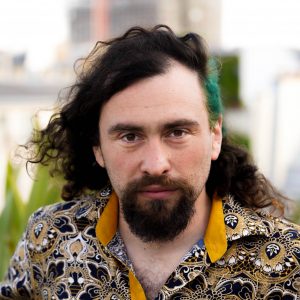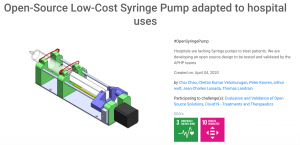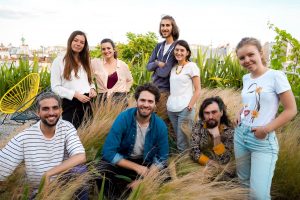Just One Giant Lab Co-Founder Leo Blondel on the Power of Community and Open Source During COVID-19
Open Science, TechnologyThousands of strangers working together, almost entirely online, to effectively solve an urgent, global challenge is remarkable—and it’s happening, right now. Recently, we published a post titled, “Open-Source Medical Hardware: What You Should Know and What You Can Do” examining the collaborative efforts by volunteer groups, universities, and research centers to solve the medical supply shortage caused by the COVID-19 pandemic through open-source medical hardware. While researching that story, we stumbled on the work of Just One Giant Lab (JOGL).

JOGL Co-Founder and CTO Leo Blondel. Image by Thomas Landrain (CC BY).
JOGL is a research and innovation laboratory based in Paris, France that operates as an open and distributed mobilization platform for collaborative task solving. When the pandemic started, JOGL’s team recognized that their knowledge of community organizing and their open platform could help create and support many open-source projects. In response, they launched the OpenCovid19 Initiative, which now includes over 4000 healthcare workers, engineers, designers, scientists, technologists, and everyday citizens. The vibrant, global community exchanges thousands of daily messages on hundreds of projects they hope will help save lives; from an open-source syringe to an algorithm that calculates the probability of infection.
To get a better understanding of JOGL’s mission, its community, and open source work, we reached out to Co-Founder and CTO Leo Blondel via email.
Our interview has been lightly edited for clarity and length.
Q: What’s Just One Giant Lab’s (JOGL) mission?
Blondel: Our mission from the beginning has been to become the first full-fledged virtual laboratory where users can collaborate and innovate in order to solve problems and answer research questions—we want to be a central hub for open science and innovation. On the social side, we aim to help humanity fix its most urgent and important problems using open science, responsible innovation, and continuous learning. To that end, we partner with academic labs, companies, startups, foundations, NGOs, and public services to create participatory research programs for understanding and solving health, environmental, social, and humanitarian issues. On the technical side, we create and utilize a series of open-source applications to support the research and innovation activities generated by our users. To this aim, we have created a platform where users can launch their projects and collaborate openly with others to solve pressing needs.
Q: What are some initiatives JOGL is working on in regards to the medical supply shortage?
Blondel: Currently, multiple initiatives are being developed. We quickly identified that many factories, maker spaces, and citizens had a production capacity that could be put to use. Due to the beauty of open-source projects, the number of available prototypes was staggering—over 70 designs for open masks, for example. Therefore a project was created to review, test, and select the designs that were the most relevant, safe, compliant, and easily manufactured by a panel of medical experts. Armed with this idea, we created a partnership with the Paris Hospital Network (APHP) to organize a validation challenge and identified four essential needs: face masks and face shields, syringe pumps, consumables for intubation, and ventilators. So far, the Open-Source Syringe Pump project has been selected, and a team composed of medical doctors, engineers, and manufacturers are working to get the device refined with a foolproof user experience (UX) design and fail proof delivery system. Finally, a long-running open-source respirator project is currently in the testing phase to prove that the design is applicable in a medical setting.

An image of the Open-Source Low-Cost Syringe Pump design adapted to hospital uses under development at JOGL.
Q: How is JOGL working across its entire community to help fill the medical supply shortage?
Blondel: JOGL acts as the central hub that connects citizens, amateurs, medical doctors, researchers, and policymakers. By creating a central repository of knowledge where people can not only document, but also discuss, and collaborate on open research and innovation we accelerate what would normally require established professional networks. An example is the aforementioned Open-Source Syringe Pump project, where JOGL connected the knowhow of the medical doctors at the Paris Hospital Network to engineers in the United States and manufacturers in China. JOGL not only provides the technical tools necessary for this to happen, but also the coordination team necessary to establish relationships between humans and ideas.
We are also creating and implementing a new open governance scheme so that communities can self organize more easily. For this, we are working with wonderful community members who specialize in management, sociocracy, holacracy, and other new and exciting forms of open governance. We hope that this beta test will help us establish new and clear guidelines and models to create better UX and user flows in order to fast track similar collaborations in the future.
Q: Have you been surprised at the willingness of your community to volunteer their time and resources to help with these initiatives?
Blondel: I was not surprised. From a historical perspective, times of crisis have more often than not created enormous solidarity movements. Most recently, Hurricane Maria in Puerto Rico saw the regeneration of community links long lost. People flying back to help and thousands of people rebuilding infrastructure for free—a great read on this would be Naomi Klein’s The Battle For Paradise. As an evolutionary biologist, I think that because we have evolved to be a social species and have empathy, it’s hard for us to stand inactive when we see misery. So I wasn’t surprised that people organized to help. Open communities are the foundational structure of JOGL, and we have always believed in their power to change the world. What did surprise us was the willingness of large institutions to trust initiatives like ours in a time of crisis and to try to establish partnerships with us to strengthen the community effort. We are now seeing a shift in how large actors are seeing open initiatives and I believe it’s for the best!
Q: What impact do you think the COVID-19 pandemic will have on open source and open science?
Blondel: I think that this pandemic happened at a time where open communities were “ripe.” What I mean by that is for a long time the open world was not very inclusive to the general public. However, thanks to, in part, the citizen science movement, there is general public enthusiasm for open research and innovation. It’s hard to predict the future, but I hope that big institutions like the World Health Organization (WHO) will start funding open science initiatives.
However, the open science movement still needs to prove itself to the world. By nature, computer code lends itself to being openly accessible more easily; you really only need a computer to work on open-source coding projects. Science, on the other hand, is much harder because there is a lack of access, particularly in regards to physical access to laboratories and resources. The validation process can also serve as a barrier. Therefore, figuring out how to break down these barriers to scientific resources and increase the production of scientific work that is open access is something we are incentivized to work on right now—and something we will continue to work on for many years to come.
If you have a question regarding CC Licenses and how they apply to open-source hardware designs or other projects, please feel free to contact us at info@creativecommons.org.
Posted 28 April 2020